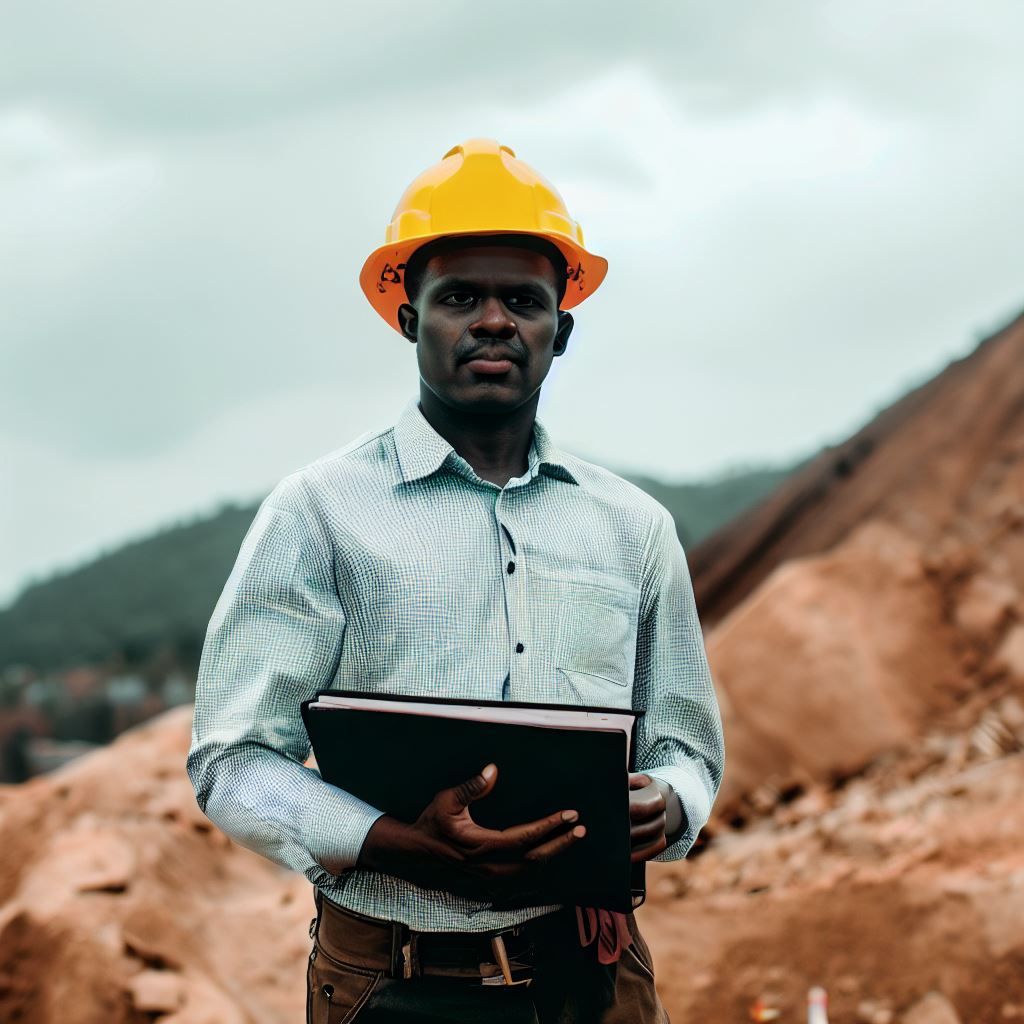Introduction
Continued education is crucial for geologists in Nigeria to stay updated and enhance their skills.
This blog post emphasizes the significance of ongoing education for Nigerian geologists, discussing available resources, professional growth, and career advancement.
Continuing education ensures geologists have the latest knowledge and expertise, allowing them to contribute effectively to the field.
We will also delve into the various platforms and programs available for geologists to pursue continued education in Nigeria.
It is essential to explore the benefits and opportunities that continued education offers, including networking, staying ahead of technological advancements, and expanding professional horizons.
Additionally, we will highlight the significance of continuous learning in maintaining a competitive edge in the geology industry.
By actively engaging in continued education, geologists can broaden their understanding, develop new skills, and adapt to evolving practices and technologies.
The blog post aims to provide geologists in Nigeria with valuable insights and guidance regarding the importance and avenues for continued education.
Current State of Geology Education in Nigeria
Overview of the existing geology education system in Nigeria
Despite the existing geology education system in Nigeria, accessing quality education in this field remains a significant challenge for aspiring geologists.
The current state of geology education faces several limitations that hinder the overall development and growth of the profession.
First and foremost, the lack of adequate funding from the government significantly impacts the functioning of geology departments in universities.
Insufficient financial resources limit the availability of updated laboratory equipment and impede practical training, which is vital for geology students to apply their theoretical knowledge in real-world scenarios.
The government should allocate more funds to these departments to ensure that students receive a comprehensive education.
- Geology education in Nigeria is offered at the undergraduate and postgraduate levels.
- Several universities across the country offer geology programs, including the University of Lagos, Ahmadu Bello University, and the University of Ibadan.
- The curriculum includes courses in geology, mineralogy, petrology, geophysics, and paleontology.
- Practical fieldwork and laboratory research are also essential components of geology education in Nigeria.
- Geotechnical consulting firms and government agencies often recruit geology graduates.
Challenges and limitations faced by geologists in accessing quality education
The shortage of qualified and experienced faculty members in geology departments poses a significant challenge.
Limited faculty means a higher student-to-teacher ratio, compromising the quality of education and mentorship.
Hiring and retaining well-qualified faculty members should be a priority for universities offering geology programs to enhance the learning experience for students.
In addition, the limited availability of scholarships and grants for aspiring geology students further exacerbates the challenges.
Many talented individuals with a passion for geology may be unable to pursue their dreams due to financial constraints.
By increasing scholarship opportunities, more students would have access to quality education in geology, thereby boosting the growth and development of the profession.
- Lack of adequate funding from the government for geology departments in universities.
- Insufficient infrastructure and outdated laboratory equipment affect practical training.
- A shortage of qualified and experienced faculty members in geology departments.
- Limited availability of scholarships and grants for aspiring geology students.
- Inadequate research funding and opportunities for geologists to contribute to the field.
- There is low public recognition and support for the importance of geology education in Nigeria.
Overall, while geology education exists in Nigeria, the challenges and limitations faced by geologists in accessing quality education need to be addressed.
Adequate funding, improved infrastructure, qualified faculty, scholarship opportunities, research funding, and public support are essential for the development and advancement of geology education in Nigeria.
Importance of Continued Education for Geologists
How continued education enhances professional growth
- Continued education equips geologists with up-to-date knowledge and skills in their field.
- It allows geologists to stay informed about new technologies, methodologies, and discoveries.
- Continuous learning enhances problem-solving abilities and critical thinking skills of geologists.
- Geologists who pursue further education demonstrate a commitment to their profession.
- Continued education provides opportunities for geologists to expand their professional network.
- It helps geologists adapt to changes in the industry and remain competitive in the job market.
- Further education allows geologists to specialize in specific domains and become subject matter experts.
- Geologists who engage in continued education are more likely to be promoted or offered leadership roles.
- Continuous learning fosters a culture of innovation and encourages geologists to think outside the box.
- Through continued education, geologists can explore new research areas and contribute to advancements in geology.
Benefits of staying updated with the latest advancements in geology
- Being aware of the latest advancements ensures geologists use the most efficient and accurate methods.
- Staying updated helps geologists identify potential risks and take appropriate preventive measures.
- Geologists who stay informed are better equipped to tackle complex geological challenges.
- Knowing the latest advancements enhances geologists’ credibility and reputation among peers and employers.
- Keeping up-to-date with advancements opens doors for collaborations with other professionals and institutions.
- Being aware of new technologies can lead to cost-saving measures and efficient resource management.
- Staying updated helps geologists integrate interdisciplinary knowledge and approach problems from different angles.
- Awareness of advancements allows geologists to contribute to sustainable and responsible geological practices.
- Staying updated fosters a culture of continuous improvement and professional excellence in the field of geology.
- Knowledge of latest advancements empowers geologists to make informed decisions and provide accurate insights.
Potential career opportunities that can be unlocked by pursuing further education
- Pursuing further education opens the door to research and academic positions in universities and research institutions.
- Advanced degrees can lead to leadership roles in geology-related government agencies or regulatory bodies.
- Geologists with advanced education may have higher chances of being involved in major geological projects.
- Further education increases the chances of geologists being selected for international assignments or collaborations.
- Advanced degrees often lead to higher salaries and better job prospects in the geology industry.
- Continued education can open doors to consulting and advisory roles in the private sector.
- Geologists with further education may have opportunities to work on large-scale infrastructure development projects.
- Advanced knowledge gained through further education can enhance geologists’ entrepreneurial prospects.
- Pursuing further education can qualify geologists for teaching positions at universities and academic institutions.
- Advanced education can lead to specialization in niche domains, creating unique career opportunities for geologists.
It’s essential to research your desired field and consider the level of education and training required for your target career path.
Read: Famous Nigerian Geologists: Their Work and Contributions
Available Resources for Continued Education
Overview of universities and institutions offering postgraduate programs in geology in Nigeria
- University of Lagos
- University of Ibadan
- Obafemi Awolowo University
- University of Nigeria
- Ahmadu Bello University
- University of Port Harcourt
- Federal University of Technology, Akure
- University of Ilorin
The quality and relevance of these programs
The postgraduate programs in geology offered by these universities and institutions are highly reputable and relevant in the field.
They provide comprehensive knowledge and practical experience in various geological aspects.
Available scholarships and funding options
- National Universities Commission (NUC) Scholarships
- Government-sponsored scholarships
- Industry-funded scholarships
- Research grants for geology students
- Affiliated academic societies scholarships
The NUC and Nigerian government provide scholarships for postgraduate students in various fields of study, including geology.
These scholarships help students financially and support them in pursuing higher education in the field.
Additionally, several industries, such as oil and gas companies, offer scholarships to geology students.
These scholarships often come with future employment opportunities, enabling students to gain practical experience while continuing their education.
Furthermore, there are research grants available for geology students who wish to conduct specific research projects during their postgraduate studies.
These grants provide financial support and resources for conducting fieldwork and laboratory experiments.
Nigeria offers a range of resources for geologists seeking continued education.
The universities and institutions providing postgraduate programs in geology are renowned for their quality and relevance.
Moreover, there are various scholarships and funding options available to support students financially and facilitate their academic journey in the field of geology.
Read: Using Technology in Geology: Trends in Nigeria

Professional Development Opportunities
Workshops, Conferences, and Seminars Focused on Geology in Nigeria
Geologists in Nigeria can benefit from various professional development opportunities such as workshops, conferences, and seminars that specifically focus on geology. T
These events provide a platform for geologists to enhance their knowledge and skills.
Attending workshops allows geologists to delve into specific topics in geology, gaining in-depth insights from experts in the field.
Workshops often involve practical sessions where participants can apply their knowledge, further strengthening their expertise.
Conferences bring geologists together from different institutions and backgrounds, fostering knowledge sharing and networking opportunities.
Geologists can present their research work, exchange ideas, and receive valuable feedback from their peers.
Workshops and seminars are usually organized alongside conferences, adding more value to the overall experience.
Seminars provide a platform for geologists to stay updated with the latest advancements, trends, and techniques in geology.
Renowned geologists deliver presentations on various topics, keeping professionals informed about the industry’s current developments.
Benefits of Attending Professional Development Events
Participating in these professional development events offers numerous benefits for geologists in Nigeria. Firstly, attending these events expands their knowledge base.
Geologists can learn about new technologies, research findings, and industry best practices, ultimately enhancing their skills and expertise.
Secondly, these events provide excellent networking opportunities. Geologists can interact with professionals from different organizations, academia, and research institutions.
Building connections within the industry can lead to collaborations, job opportunities, and mentorship.
Furthermore, attending such events boosts professional credibility.
Geologists who actively engage in professional development demonstrate their commitment to staying updated with the latest advancements in their field. T
This dedication enhances their professional reputation and makes them more desirable to employers.
Lastly, these events can inspire and motivate geologists.
Learning from experts and hearing success stories can ignite passion and innovation, encouraging geologists to contribute meaningfully to the field of geology.
Staying Informed about Professional Development Opportunities
To stay informed about upcoming professional development opportunities, geologists can utilize various resources.
Firstly, they can join professional geological associations and organizations in Nigeria. These associations often send regular newsletters and emails with information about upcoming events.
Another way to stay informed is to follow relevant social media accounts and websites of geology-related organizations.
Many events are advertised through these platforms, providing geologists with easy access to registration details and event schedules.
Additionally, subscribing to geology journals and publications can keep geologists updated about upcoming conferences, workshops, and seminars.
These publications often feature advertisements and announcements for professional development events.
It is crucial for geologists to actively seek out professional development opportunities and take advantage of them.
By investing time and effort into attending workshops, conferences, and seminars, geologists can continuously improve their knowledge, skills, and professional network within Nigeria’s geology community.
Professional development opportunities play a significant role in the growth and advancement of geologists in Nigeria.
Attending workshops, conferences, and seminars provide valuable knowledge sharing and networking platforms.
By staying informed about such opportunities, geologists can propel their careers and contribute to the development of the geology field in Nigeria.
Read: The Future of Operations Research Analysis in Nigeria
Online Learning Platforms and Resources
In this section, we will explore the different online learning platforms and resources available for geologists in Nigeria.
Online courses and certifications have become increasingly popular in recent years, providing flexibility and accessibility to professionals seeking to enhance their skills and knowledge.
Overview of Online Courses and Certifications for Geologists
Geologists in Nigeria can access a wide range of online courses and certifications tailored to their specific needs.
These courses cover diverse topics such as petroleum geology, environmental geology, mineral exploration, and geological mapping.
Online courses offer interactive modules, videos, and quizzes to engage learners and provide a comprehensive understanding of the subject matter.
Some courses even have virtual field trips to simulate real-life geological experiences.
Advantages and Disadvantages of Online Learning
Online learning comes with several advantages for geologists.
Firstly, it allows professionals to study at their own pace and convenience, eliminating the need for rigid schedules.
Additionally, online courses often provide access to expert instructors and a global network of peers.
However, there are some disadvantages to consider.
It can be challenging to maintain discipline and motivation when studying independently.
Technical issues and limited internet connectivity can also hinder the learning process.
Furthermore, online learning may lack hands-on practical training, which is crucial for geologists.
Despite these challenges, online learning remains a viable option for geologists in Nigeria, given its flexibility and accessibility.
It complements traditional classroom-based education and provides an avenue for continuous professional development.
Recommended Online Platforms and Resources for Geologists in Nigeria
- Coursera: Coursera offers a wide range of courses from top universities and institutions worldwide.
Geologists can find courses such as “Introduction to Geology” and “Geology and Society” to enhance their knowledge. - edX: edX provides courses from renowned universities, including Harvard and MIT.
Geologists can explore courses such as “Earth Sciences” and “Geology and Human Health” to broaden their understanding. - Udemy: Udemy offers geology courses led by industry experts.
Geologists in Nigeria can enroll in courses on topics such as “Oil and Gas Geology” and “Geological Field Methods” to gain practical insights. - Geological Society of America (GSA) Online Learning: GSA provides online learning resources for geologists, including webinars, virtual conferences, and access to scientific publications and journals.
- Nigeria Geological Association (NGA): NGA offers online resources, research articles, and webinars specifically tailored to the Nigerian geological community.
Geologists can stay updated on the latest advancements in the field.
These platforms and resources provide a rich array of online learning opportunities for geologists in Nigeria.
By taking advantage of these resources, geologists can stay updated with the latest research, expand their knowledge, and develop new skills.
Online learning platforms and resources have revolutionized continued education for geologists in Nigeria.
With their flexibility and accessibility, online courses and certifications provide professionals with valuable opportunities for growth and development.
By combining online learning with practical field experience, geologists can further enhance their expertise and contribute to the geological community in Nigeria.
Read: Earthquake Studies: Role of Geologists in Nigeria
Importance of International Collaboration in Continued Education
The benefits of collaborating with geologists and institutions from other countries
- Enhanced knowledge exchange and exposure to different geological perspectives.
- Access to advanced research facilities, equipment, and technologies.
- Promotion of cultural diversity and global networking opportunities.
- Strengthening of research capabilities and the development of innovative solutions to geological challenges.
- Opportunities for joint research projects and publications, increasing the visibility and impact of Nigerian geologists.
- Establishment of international benchmarks and standards for geological education and practices.
- Improvement of teaching methodologies through the adoption of best practices from international partners.
- Increased funding opportunities through international grants and scholarships.
- Development of global understanding and collaboration to address common geological issues such as climate change and natural disasters.
- Improvement of career prospects and job opportunities for geologists in Nigeria.
Existing collaborations and partnerships in geology education in Nigeria
- Nigerian geologists actively participate in international conferences, workshops, and seminars.
- Institutional partnerships between Nigerian universities and foreign institutions for faculty and student exchange programs.
- Collaborative research projects between Nigerian geologists and international researchers.
- Membership of Nigerian geologists in international organizations and societies promoting collaboration.
- Joint publications and research outputs by Nigerian geologists in collaboration with international counterparts.
- Participation in international geological surveys and field studies.
How geologists in Nigeria can actively participate in international collaborations
- Establish and strengthen professional networks with international geologists through online platforms and conferences.
- Seek opportunities for short-term research visits or exchanges with foreign institutions.
- Apply for international research grants and scholarships to support collaborative projects.
- Collaborate with international researchers on joint publications and research proposals.
- Engage in interdisciplinary research that requires international collaborations.
- Promote the involvement of Nigerian geologists in international geological societies and organizations.
- Advocate for the inclusion of international collaboration as a key component of continued education for geologists in Nigeria.
- Encourage the sharing of resources, data, and expertise with international counterparts.
- Participate in international geological conferences, workshops, and training programs to enhance professional skills and knowledge.
By actively participating in international collaborations, geologists in Nigeria can broaden their horizons, gain valuable insights, and contribute to the global advancement of geological sciences.
Publish Your Professional Profile, Business or Brand
Showcase your expertise, gain trust, and boost visibility instantly on Professions.ng.
Publish NowConclusion
The key points discussed in the blog post
Throughout this blog post, we have explored the importance of continued education for geologists in Nigeria.
We explored how geologists can benefit from continuing their education: staying updated, expanding knowledge and skills, and boosting careers.
Encouragement for geologists in Nigeria to prioritize continued education
It is crucial for geologists in Nigeria to prioritize their continued education.
By investing time and effort into pursuing additional courses, attending workshops or conferences, and engaging in professional development opportunities.
Geologists can position themselves as highly competent professionals in the ever-evolving field of geology.
Final thoughts on the potential impact of continued education on the geology sector in Nigeria
The impact of continued education on the geology sector in Nigeria cannot be underestimated.
A well-educated, skilled geologist workforce will contribute to sector growth, address environmental challenges, and manage natural resources effectively.
Continued education is key to ensuring that geologists are well-equipped to tackle these challenges effectively and sustainably.
Geologists in Nigeria must recognize the value of continued education and actively pursue opportunities to enhance their knowledge and skills.
By doing so, they will not only secure their own professional growth but also contribute to the advancement and success of the geology sector in Nigeria.




